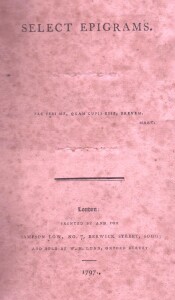 Found among papers at Jot HQ is this distinctly battered copy of volume one of Select Epigrams(1797) by William Barnes Rhodes, a rather interesting writer. Our copy lacks boards, has its title, but lacks one leaf (pages 29 and 30), three leaves (pages 57 – 62 ) , part of page 73 and pages 159 – 188. These omissions don’t exactly add to the appeal of what is left, but the incomplete book is worth reading, not least for its defects.
Found among papers at Jot HQ is this distinctly battered copy of volume one of Select Epigrams(1797) by William Barnes Rhodes, a rather interesting writer. Our copy lacks boards, has its title, but lacks one leaf (pages 29 and 30), three leaves (pages 57 – 62 ) , part of page 73 and pages 159 – 188. These omissions don’t exactly add to the appeal of what is left, but the incomplete book is worth reading, not least for its defects.
For one thing, anyone encountering the volume for the first time, as your Jotter did, would assume that the book consisted of one volume only. This is because someone, for whatever reason, has seen fit to erase the words IN TWO VOLUMES and VOLUME ONE from the title page. We know that our copy is the first volume because the contents of volume two from the Bodleian Library, has been digitalised and appears online. It is not known why volume one has not been digitalised in the same way. Incidentally, both volumes of the first edition are currently for sale through abebooks, but the bookseller has erroneously declared that the first edition is the ‘sole edition’, when in fact a second edition, was brought out in 1803 by William Miller, who published Washington Irving’s Sketch Book in 1820.
William Barnes Rhodes, like Charles Lamb, had a full-time job as a clerk while he pursued a literary career, but while Lamb worked at the East India House in the City, Rhodes, who was born in Leeds in 1772, obtained in 1799 a post at the Bank of England, just down the road from Lamb. It is intriguing to speculate whether the two men ever met. It is very likely, given their respective avocations, but Rhodes does not feature in Lamb’s correspondence. Interestingly, in 1823 Rhodes was promoted to the office of Chief Teller at the Bank, just two years before Lamb took early retirement from East India House.
Like Lamb too, Rhodes was interested in the theatre, though we don’t know if he was a great playgoer. He was evidently a well-paid official. At the great Roxburghe sale in 1812, when one of only two copies of Boccaccio’s Decameron dated 1471 fetched well over £2,000, and other fabulous books and manuscripts did equally well, Rhodes made large purchases of theatrical material. It was on the eve of this famous sale that the Roxburghe Club was formed by a group of leading bibliophiles. It is not known if Rhodes became a member, but he would have been interested in the objectives of this coterie. We are not aware of the actual contents of his library, but we do know that it was sold in 1825. Perhaps Rhodes sensed that his demise was near and wanted to provide for his new wife, who he had married that same year. He died a year later aged just 54.
Rhodes was just twenty-five when he published Select Epigrams. Judging from the material in volume one it is obvious that he was a voracious reader of ‘polite literature ‘; many of the epigrams are English renderings of Roman poets, principally Martial, but there are also a number of original examples from contemporary or near contemporary satirists, including such relatively minor writers such as Matthew Green, William Harrison and George Jeffreys, as well as the more well-known Samuel Johnson, Congreve, Addison and Christopher Smart. All in all, Select Epigramsis a very entertaining anthology and betrays a love of classical and modern literature and a critical sense that for someone of his young age and lack of a university education is quite extraordinary. Here, for instance, are his comments on the Rev. Samuel Bishop’s Poetical Works, which had been published in 1796:
‘In familiar and epigrammatic effusions the late valuable master of Merchant Taylor’s eminently excelled. His thoughts are original; his diction is unaffected; and his numbers , if they, now and then, offend the nice era of criticism, are, generally, smooth. He may justly be called the Martial of our country, and let it be said to his credit, that with the wit of the Roman, he is free from his coarseness’.
Of Rhodes’ best known work, the Bombastes Furioso of 1810 ( printed 1822), a drama with comic songs that satirizes the bombastic style of other tragedies, it is difficult to say much. Based in part on Orlando Furioso ( 1516) by Ludovico Ariosto, its farcical plot and ridiculous characters were evidently a reflection of Rhodes’ satirical sense, expressed so very strongly in his Select Epigrams.[RR]

If William Barnes Rhodes’ job was anything like Peacock’s, “full-time” is not an entirely accurate description. Peacock’s routine day:
From ten to eleven, ate a breakfast for seven:
From eleven to noon, to begin ’twas too soon;
From twelve to one, asked, ‘What’s to be done?’
From one to two, found nothing to do;
From two to three began to foresee
That from three to four would be a damned bore.
Sounds like a lockdown schedule for a large (big beakfast) slacker.. You’ve got to love Thomas Love